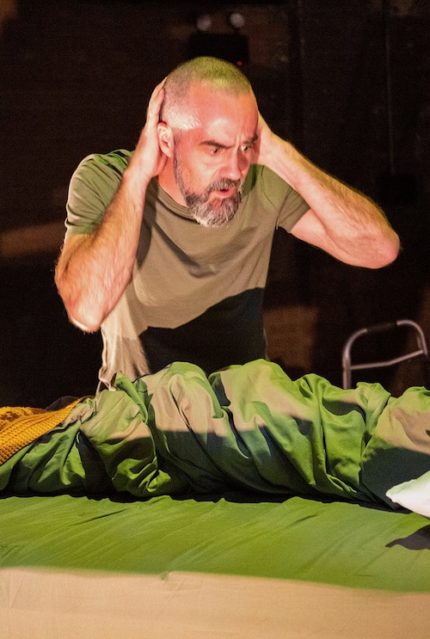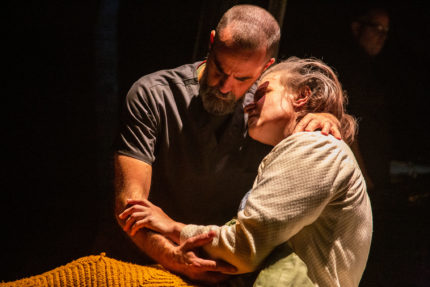Third Eye Theatre delivers a powerful modern retooling of “Beowulf”

If you’re not up on your thousand-year-old Anglo-Saxon epic poetry, fear not. Appreciating Third Eye Theatre Ensemble’s presentation of Beowulf does not necessitate a familiarity with the celebrated original work.
The opera is less a reimagining of the story and more a variation on its themes. In the opera, composer and librettist Han Lash transforms Grendel and the dragon into psychological monsters. Here, the character of Beowulf is a different kind of hero—not a warrior and king, but a veteran military doctor who struggles with post-traumatic stress disorder while also caring for his mother.
Beowulf is not the only character who faces demons. His mother, who suffers from dementia, resists being in the care home and accuses her nurse of maltreatment, while the nurse faces a wounded reputation after Beowulf removes her from the facility. As Beowulf cares for his mother at home and as she begs him to help end her life with dignity, his past traumas seep into his present, as he hallucinates about a young girl whom he was unable to save in the war.
The Edge Off Broadway, a small black box theater in Andersonville, was an appropriately intimate space for this chamber opera, scored for three singers, clarinet, saxophone, percussion, and violin. Accommodating only 45 chairs around three sides of the theater, the space at first seemed claustrophobic, but the opera soon proved well-suited to this kind of venue. The extreme closeness to the stage allowed for intimate singing as well as subtle acting that intensified the emotions of the story.
The proximity of the audience to both the action and the orchestra made moments of drama particularly harrowing, such as the percussion thunderclaps during Beowulf’s flashbacks to the war and the tumultuous music when the mother rips out her IV. But the intimate ending where Beowulf shows mercy to his mother and helps her die was tender and heartbreaking. Performing this opera obviously takes great vulnerability and emotional energy, and for that, Friday night’s cast and stage director Rose Freeman should be commended.
As Beowulf, baritone Noah Gartner proved a captivating presence both vocally and dramatically as he paced his room in the opening scene, trying to assure himself that he was home and not back in the war. Possessing an attractive lyric baritone voice, Gartner lent the intimate vocal lines a lieder-like quality, while the confrontation scene with the nurse at the end brought out an arresting yet balanced fortissimo.

Soprano Mary Lutz Govertsen was highly convincing as the mother suffering from dementia. Her subtle facial expressions and vocal coloring helped to convey her character’s confusion, anxiety, and love for her son. With excellent diction and dramatic intention, she was able to turn the often random-seeming vocal lines into meaningful text.
Tenor Vincent McPherson completed the cast as the well-meaning but maligned nurse. Though he only had a few short vocal appearances, he demonstrated a powerful top in his duet with Beowulf at the end.
This opera could have been a spoken play. Lash’s music was almost incidental, serving to intensify the emotions on stage and lend atmospheric underscoring and sound effects. Much of the music was quite sparse, featuring sustained sounds from the winds and violin while the vibraphone interjected with short flourishes of notes. The vocal lines were also fairly disjointed and unrelated to the instrumental accompaniment.
As such, moments of musical beauty or coherence between the singers and the instrumentalists were few and far between. One such moment, however, was a duet between Beowulf and his mother when they sing a lullaby together in canon. Govertsen shone brightest here as she bent her robust voice into silvery pianissimo high notes.
Conductor Alexandra Enyart led the musicians with confidence and poise, her gestural fluidity and clarity helping to keep everything together. That proved a challenge with the conductor and instrumentalists placed behind the stage, which meant that the singers often had to watch Enyart from monitors in the corners of the room. This allowed for flexibility in staging but was also fairly noticeable as the singers fixed their gazes on the screens during difficult entrances.
Of the instrumentalists, percussionist James Yakas especially impressed as he rattled off virtuosic flurries of notes on the vibraphone in a very dark theater. Saxophonist Richard Brasseale, violinist Ash Fitzwater, and clarinetist Cally Laughlin provided firm grounding as the rest of the orchestra.
The small space was used thoughtfully by set designer Sam Stephen and lighting designer David Goodman-Edberg. To separate the stage from the audience, debris outlined the perimeter of the stage, while remnants of light fixtures, furniture, medical gauze, and other items were suspended from the ceiling as if shrapnel in the immediate aftermath of an explosion.
Though Lash’s bland music left minimal impression, Beowulf is a powerful piece of theater thoughtfully brought to life by the Third Eye Theatre Ensemble. You may want to bring a pack of tissues for this emotionally arresting work.
Beowulf will be repeated 7:30 p.m. Saturday and 3 p.m. Sunday. thirdeyete.org; eventbrite.com
Posted in Performances




